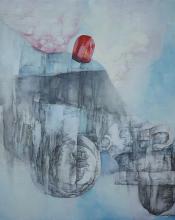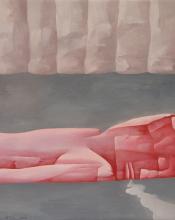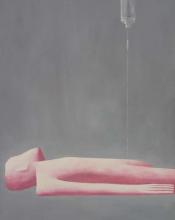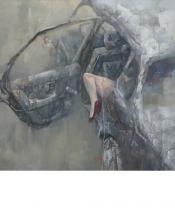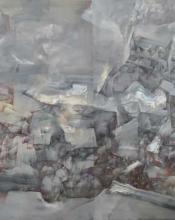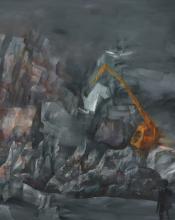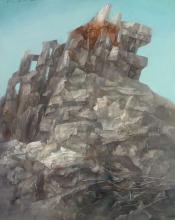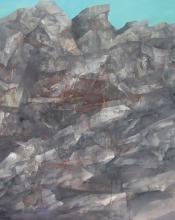Chen Yufei
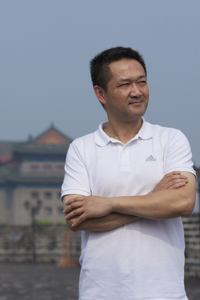
Spiritual Wanderer: A Reading of the Works of Chen Yufei: Li Xu
Among contemporary Chinese artists, Chen Yufei can be considered an “old revolutionary.” He was born in 1962, entered college at age 15, and graduated by 19. It was 1982. The precocious artist devoted himself to the “85 New Wave” avant-garde movement and became the movement’s leader in Anhui. After that, he underwent a period of social upheaval that all Chinese artists experienced. For many years, he struggled constantly between the realities of life and the ideals of art. He went south to work in Shenzhen and abroad to study in Germany. He then rented a studio in Beijing to work and engage in shared creation, but, for the most part, he spent his time in themidsize city of Hefei.
In the last twenty years, Chen Yufei has always maintained a high level of awareness of changing environments and the complications of human nature. His work is a different kind of mirror image of contemporary Chinese society, like an abnormal branch growing out of the same trunk. The numerous and complicated, disorderly, and unsystematic backdrops actually conceal something that resembles spiritual symptoms. This is an era in which societies are becoming increasingly stratified and an unprecedented multitude of value systems exists. In the midst of major political and economic changes, attempts to reconstruct order and appeals of conviction were greeted with various challenges; efforts to fight for equality and justice also never cease. His recent works are usually flooded with a sea of faces, fragmented limbs, rusted machinery and polluted skies; this is the artist’s summary of real life survival. At the same time, it is a portrait of a chaotic society’s path of material and spiritual transformation.
"Chen Yufei is an artist who cares deeply about society"
Li Xu
Chen Yufei once commented, “China’s rapid process of economization has ushered in many fresh experiences, causing large conflicts between our ideas and actions. I think that for people like me born in the 1960s who experienced the revolution and once held naïve cultural ideals, being catapulted into the process of commercialization in this new era is complicated and taxing on the soul. Congestion and squeezing are the main feelings unique to my works. Whether it is perceived visually or psychologically, it is the same. I use almost frozen, convulsing figures to express the attitude of people in this particular point in history.”
Hefei is not a large city, but since the beginning, Chen Yufei’s art has had a distinctly urban feel. This has much to do with his long-term observations of urban culture. From a psychological perspective, the more people live in a place, the more strangers there are; the extreme disregard for individual value in a large city is therefore normal in day-to-day survival. From an ecological perspective, the more people live in a place, the more trash; the frivolous neglect of long-term benefits is also a malignant habit ushered in by high-speed development. From the perspective of a visual analyst, the more people live in a place, the more images emerge from it; chaotic sensory images cause humans and matter to interweave. Even a hometown can become an alien land.
Chen Yufei’s early figurative and landscape paintings from the mid to late 1980s already reveal a visual perspective unique from that of the masses. Softened Cubism, Paul Klee’s morbidezza brushstrokes and hyperrealism all hint at his strong sense of alienation from the real world—lonesome and rebellious, aesthetic yet sentimental. Afterwards, in the early 1990s, in a series of experimental works on paper, he borrowed elements from Neo-Expressionism and naïve art. In this series, he expresses his internal conflicts and repression through a mad release of cathartic doodles. This can be seen as the beginning of some of the “violent characteristics” that would appear in later works. In the mid-1990s, his works reached a peak. Bright, bold colours and crowded surfaces began to dominate the canvas. Deformed people and prop imagery accumulate and become entangled, like a giant, solid, weathered wall. Decay and transience: this individual grammar began here and continues to this day.
Ever since the new century began, Chen Yufei has continued making art in which human figures are the main theme, but a complicated change has occurred in the formal language: thick brushstrokes have gradually thinned out, and dry brushstrokes have turned into softened morbedezza. The uniformly warm, coloured surfaces from past works have also changed towards a richer, cooler palette. Unlike the large groups in previous works, more often, a lone figure appears in his paintings. Those running, swimming and crouched humans allow the meaning of individual space to emerge slowly. Even as he continues to depict “man,” Chen Yufei has started to shift his attention to “matter.” In his opinion, the over-commercialization of society as a whole has already caused the “exit of humans” and the “entrance of matter.” As such, a series of fire engines, cars, trucks, pedicabs and other vehicles appeared. Some were covered with heavy snow, some collide in the crowds and some are parked in the junkyard, awaiting demolition. He created a series of intimate abstractions. Among the crumbling ones with “smoke” and “clouds” as their main themes is one that concerns environmentalism and reflects the perspective of someone who once studied classical Chinese painting. His softened, uncertain forms lead the viewer to rich associations.
In actuality, Chen Yufei is an artist who cares deeply about society, as evidenced by his quote: “I am someone who lives for ideas.” He maintains a keenly critical attitude towards the deterioration of human nature, environmental pollution, shortages of resources and the problem of restoring morals. Besides continuing to probe these issues in his paintings, he also completed a few installations and performance art pieces. Using different media and formal contexts, he explores the issue of human survival.
Tracing the path of Chen Yufei’s art in the past twenty years, one discovers that he has always “resided elsewhere” intellectually; he is a “spiritual wanderer.” He entered society at age 19; what delusions fill such a youth well versed in Western classical texts? He was one of very few “avant-garde artists” in Anhui. How is an outsider to speculate about the loneliness of long-term living in a city like Hefei? Chen Yufei once told me that Hefei is not a famous historical site and that there is nothing spectacular about the city itself. Little moral or ethical consideration goes into its changes. Yesterday’s grassy suburb might become the construction site of a new large-scale development zone overnight. How is this “hometown” any different from a “foreign land?” In one of his latest works, a huge shovel has excavated the scarlet earth and the mound that floods the surface of the piece resembles a dismembered body; in the mist of the cold, gray backdrop, a large airplane plunges ahead with a quick blow. After analyzing the internal, psychological aspects, we can better understand his restless soul, the overlapping random images, his apathetic critical attitude and that intense, unique sense of social alienation.
In today’s rapid urbanization, artists openly concerned with society are dwindling in number. The content of art is also growing more distant from the public domain and heading toward private space. Chen Yufei’s work is not crowd-pleasing. Over the years, his works have maintained consistency with his own impulses. In this regard, his efforts are precious, and his art should be valued among the prized works of this era.
January 10, 2007
Shanghai
Translated from the Chinese by Philana Woo
|
1962 |
Born in Hefei |
|
|
1977-1981 |
Fine Art Dept. of Anhui Normal University |
|
|
1997-1999 |
Academy of Arts Braunschweig Germany |
|
|
Present: |
Vice-professor of the School of Architecture & Art, |
|
|
|
Hefei University of Technology |
|
|
|
|
|
|
Solo Exhibitions |
||
|
|
|
|
|
2017 |
What Actually has Happened? Chen Yufei’s Performance Art Theater, Yuan Art Gallery, Chongqing |
|
|
2016 |
Cross-media Art Performance Installation and Experimental Theater, Hefei |
|
|
2010 |
Reboot, Galerie Junger, Shanghai |
|
|
2009 |
Rearview Mirror: A Retrospective 1984 - 1996, Magee Art Gallery, Madrid |
|
|
2008 |
Chen Yufei, Shengling Art Gallery, Shanghai |
|
|
2007 |
Chen Yufei, Red Gate Gallery, Beijing |
|
|
2005 |
Chen Yufei, M. Sutherland Fine Arts, New York |
|
|
2002 |
Chen Yufei, Avant-garde Gallery, Shanghai |
|
|
1997 |
Chen Yufei’s Studio Opening, Academy of Arts Braunschweig, Germany |
|
|
1996 |
Knots - Chen Yufei, Great Wall Hotel, Beijing |
|
|
1994 |
Chen Yufei’s Art Space, Yun Feng Gallery, Beijing |
|
|
1993 |
Chen Yufei, Ron Einblau Gallery, Vancouver, Canada |
|
|
1992 |
Chen Yufei, Gallery 13, Hongkong |
|
|
|
|
|
|
Group Exhibitions |
||
|
|
|
|
|
2019 |
Our Voice, 5th Phenomenon, Hefei |
|
|
|
Art Hefei-The Season of Contemporary Art, Diesel Engine·1972, Hefei |
|
|
2018 |
6th Burnt of Snow Performance Art Festival - -19℃, Inner Mongolia |
|
|
|
Rolling Snowball Nanjing, School of Fine Arts Nanjing University of the Arts, Nanjing |
|
|
|
WOW International Performance Art Festival, Shenzhen |
|
|
|
GUYU ACTION 12th International Performance Art Festival, Performance Art Theatre; Daily Five Heart Gallery; Art Café, Xi'an |
|
|
|
Graphics - Fiction, Yi Art Institute, Hefei |
|
|
|
798, We Are Back, Red Gate Gallery, Beijing |
|
|
2017 |
Red Gate on the Move, Red Gate Gallery, Beijing |
|
|
|
5th UP-ON International Live Art Festival, Chengdu |
|
|
2016 |
Beijing Live International Performance Art Festival, Beijing |
|
|
|
Daily Reflection Online Live Performance Art Festival |
|
|
|
116m2 + POP UP Painting Biennial, Hangzhou |
|
|
|
Cold Light - Installation Art, Hefei |
|
|
2015 |
Depict Our Meeting in Xucun -- 2015 3rd He Shun International Village Art, Shanxi |
|
|
2014 |
Jeju International Experimental Arts Festival, Jeju, Korea |
|
|
2013 |
Voice of the Unseen / Chinese Independent Art 1979 - Today, La Biennale di Venezia, Venice, Italy |
|
|
|
Infr’ Action Venezia, Venice, Italy |
|
|
|
Live Action 8 - International Performance Art Festival, Gothenburg,Sweden |
|
|
|
Tangled Dislocation Double - by Chen Yufei and Ma Baozhong, Xin Zhu, Taiwan |
|
|
2012 |
Guangzhou Live 3, International Action Art Festival, Guangzhou, China |
|
|
|
In the Prime of Vitality, Lofty Gallery, Taibei |
|
|
|
Two Generations - 20 Years of Chinese Contemporary Art Australian Tour: City of Sydney Chinese New Year; Manning Regional Gallery; Damien Minton Gallery; University of Newcastle Gallery; Melbourne International Fine Arts (MiFA); Linton & Kay, Perth |
|
|
2011 |
20 Years - Two Generations of Artists at Red Gate, island6 Art Center, Shanghai |
|
|
|
20 Years - Two Generations of Artists at Red Gate, Red Gate Gallery Red Gate Launch Pad – Celebrating 10 Years of Artists in Residence, Red Gate Gallery, Beijing |
|
|
2010 |
Landscape in Transition—Yuzi Paradise International Art Symposium, Shanghai |
|
|
|
21st Century Visual Artistic Archives, Beijing |
|
|
2008 |
Art is Nothing, 798 Art Area |
|
|
|
Paintings and Sculptures in the Digital Age, Chengdu |
|
|
|
Art Charity China - 2008 China Contemporary Art International Tour, Beijing, Hongkong, Tokyo |
|
|
|
Red Gate Stars, Red Gate Gallery |
|
|
|
Different Perspectives, 798 Red Gate Gallery, Beijing |
|
|
2007 |
Here and Now, Academy of Arts, Braunschweig, Germany |
|
|
|
Avant - Garde Chinese Contemporary Art, Hong Kong |
|
|
2006 |
Limited and Free, Art Centre, Wuhan |
|
|
2005 |
San Francisco International Contemporary Art |
|
|
|
International Art Camp, Beijing |
|
|
|
First Five Artists in Residence Exhibition, Red Gate Gallery |
|
|
|
Together & Different, 798 Ren Art Center, Beijing |
|
|
2004 |
2004 Asia Contemporary Art Exhibition in Gwangju, Korea |
|
|
|
A Sack of Rice, Performance and Theatre Festival, Berlin |
|
|
|
New Year 2004 - Image, Guangzhou Academy of Art |
|
|
|
8-2 Contemporary Art, Beijing Art Documents Storehouse |
|
|
|
Double Imagination, Shenghua Arts Centre, Nanjing |
|
|
2002 |
Triennial of Chinese Arts, Guangzhou |
|
|
|
Touching Memory, Yi Dian Gallery, Shanghai |
|
|
2001 |
100 Faces Photograph of Conception, Grosse Kunstausstellung NRW |
|
|
|
Duesseldorf, Germany |
|
|
1999 |
China 46 Contemporary Art, Melbourne, Taipei, New York |
|
|
1997 |
Rounding, Academy of Arts in Braunschweig |
|
|
1989 |
China Avant–garde, No U Turn, National Gallery of China |
|
|
|
|
|
|
Main Public Collections |
|
|
|
|
|
|
|
Shanghai Art Museum, Today Art Museum, Beijing, Deutsche Bank, SIEMENS, Red Classics Gallery, China Guangda Bank, Yuanquan Advertising, BHP Billiton China, IACfund, Henan Province Art Museum, Suzhou True Color Museum |
|
|
The connotation of my recent works can be summed up by two words, “chaotic beauty”. The roles, whether man or object, are spasmodic, unbridled, wild, restless, squeezed, jammed, bound, feculent, uneasy, disorderly and absurd without any exception.
Chen Yufei

